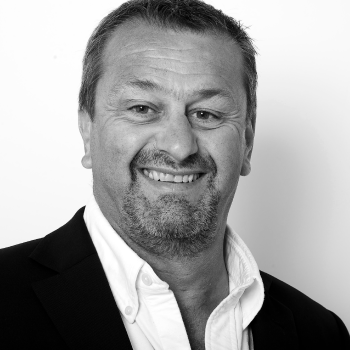Robin Hoyle and Tony Hughes discuss key insights into Learning and Development, highlight the positive effect of its proper integration with technology, explain a simple way to reflect on learning and examine key challenges for learning and development professionals evaluating training.
Transcript:
![]() Tony Hughes
Tony Hughes
I've got with me Robin Hoyle, a prominent writer and consultant in the field of learning and development. Robin's been working with Huthwaite International now for a few years and this morning we're going to ask him a few questions around what he sees as the present state of learning and development now and in the future. Huthwaite International has been in learning and development now for 40 years. For the first 26, the major innovation in learning and development was probably the move from overhead projectors to powerpoint. Obviously, the advent of e-learning in the late 20th century changed all that. So, how do you see the state of it at the moment?
![]() Robin Hoyle
Robin Hoyle
In terms of learning and development generally, I think the the issues occurred when e-learning first came on board. Everybody was talking about the idea of the blend. So we were going to put e-learning together with face to face programs, reduce a bit of time off the job, and everybody was going to be happy. I think what we're seeing now, as that's matured, is the idea that the blend is no longer enough - that we need to look at integration of learning into the workflow. In some cases technology helps us to do that. Often it's more about replicating some of the other components which go back much, much earlier than e-learning. It's about people having conversations with each other. It's about learning from your peers, but it's also about going through a structured process with your team, with your line manager and with people within the business. Not only to look at the industrial knowledge which Huthwaite gives. Huthwaite gives best practice commercial sales and negotiation training for people. But in reality, anybody who can afford it can have that. What really makes the difference is - how do you surface the institutional knowledge within the organisation to combine with that best practice, to really make that organisation special, different and unique. I think that's what people are looking for now more than ever before.
![]() Tony Hughes
Tony Hughes
That's a lot more complex than the old way of just standing up at a flip chart and writing and talking for 2 or 3 days. It's a lot more complex than 'Let's do some e-learning up front and some post learning afterwards with some computer based electronics'.
![]() Robin Hoyle
Robin Hoyle
I think so. Back in the day when we first started doing this stuff and I first worked on an e-learning project with software in 1999, for goodness sake. When we first did that activity, we were worrying about whether or not people will be given time off to do their e-learning. That made sense because the internet was not universally available at home. If it was, it certainly wasn't broadband. So anything with audio or video or things like that were impossible for people to use outside the work environment. Now you've got this computer in your pocket and the majority of Internet connected devices will be mobile or handheld. So that blurring of time and how it works is really upon us, whether we like it or not. We've got to respond to that. The interesting challenge that makes, is that organisations then attempt not to resource that process of conversation.
That process of people accessing material and most importantly, from my perspective and I've written about this extensively, this idea of when do you reflect - reflection doesn't have to be tricky. I use a model called Rolfes model. It's a very simple process. Rolfes used to train nurses. The idea was that you'd find something happening within the ward or within your interaction with your patient. You'd have to think about what you're going to do differently next time from what you've just learned. It's very simple. What happened? So what? What next? That process is very, very simple. But sometimes people need a nudge to have that thought.
![]() Tony Hughes
Tony Hughes
I suppose that that idea of when to learn is an interesting one, because learning anything is difficult. Learning new behaviours is even more difficult. And even in times when you are focused on learning as a student or maybe even as an athlete in skills development and that's your main focus, that's difficult. Trying to do it when you do any day job as well. And actually the people who are probably paying you don't see that as their main reason for you being there. What challenges does that bring and how do the new innovations you're talking about cope with those challenges?
![]() Robin Hoyle
Robin Hoyle
We're talking in the first part of the year and people have set their New Year's resolutions. A lot of those will be about weight loss. I was listening on the radio the other day about how fitness apps are causing a downturn in the business for people like Weight Watchers and Slimming World and things like that, where they have meetings. But they've all now also introduced apps. Those apps integrate with the other apps that they've got like Fitbit and things like that. If you think about that as a model for behaviour change in terms of changing your diet and living a healthier lifestyle, it's very similar. You need that mix but of joined up activity. Can you then integrate that into the work? Can you make some of those e-learning pieces very short? So from a practical perspective, you can build things that fit into people's day, but also, can you enable managers, coaches, peers to contribute to that and to maintain that motivation when it's easier to slip back into the old ways of doing things? Doing things differently and doing different things is what we're about as Learning and Development professionals. If we don't do that, we've failed. We've got to get people to the point where they can push through those difficult times when it feels like 'it's going to be a little bit easier just to go back to the way we've always done things around here.'
![]() Tony Hughes
Tony Hughes
How much does that the culture of an organisation affect that? Because it's okay with us sat here as learning and development and professionals talking about how people need to change and how we can do that with them, but they're only a part of a large multinational organisation which is focused on results and sometimes, aren't as up to speed with all this new innovation in learning and development as we are. How does the culture of an organisation affect our ability to change?
![]() Robin Hoyle
Robin Hoyle
On one level, it's absolutely vital and crucial. But I think what we do is, we talk about the culture of the organisation as though it's ONE thing. In reality, what all of the studies have shown over the years, is that the culture might be about your corner of the office. It might be about the people who you share a coffee area with. So that culture may be quite micro level. It's about getting a common approach across all those things. That's why in the really big role-outs that Huthwaite are involved in, where they're training thousands of people, the most important thing is to get this common vocabulary around the business. People talk about cultures as the way we do things around here. That's become a cliché but as with all clichés there's a lot of truth underneath it. It's about the way we do things around here. It becomes an expectation.
![]() Tony Hughes
Tony Hughes
You know that we work mainly with sales and commercial organisations, that brings some challenges for the type of people that are in there for us. Usually they're successful already. Very few of the people that we work with are, new starters. They are already quite professional sales people. They don't always see they need to change. On the upside, they've got a lot of opportunity to practice what we teach. It's inside their everyday way of working. Specifically with that group of people inside an organisation, do you see any particular challenges?
![]() Robin Hoyle
Robin Hoyle
I think there is a fundamental challenge, which is very often those individuals spend quite a lot of time working on their own. So the ability to gain that insight from other people, that second view, that opportunity to discuss a particular account or a particular case, might need to be engineered in some way. I think we can do things around helping people engineer that so that it works better that way. The other issue with individuals who are already successful is, where's the burning platform? What the need to change and why change now? And that's part of that overall communication piece within the programmes, which is 'What's the vision of the future going to be like? Why are we changing things now? What's the urgency around doing that?' Then most importantly, the next steps. If we try to define the whole journey, we overwhelm people with a whole host of stuff that they can't possibly get their head around. It is about chunking that information down into 'on this call, change this piece on the next call, we'll work on changing something else' and so on and so forth, until it becomes habitual. A lot of work performance is about habit. Changing habits, as we all know, is damned hard. But actually you can do it if you break it down into small pieces rather than this massive overarching shift from one behaviour to another thing.
![]() Tony Hughes
Tony Hughes
I often find in sales that a lot of the feedback you get is by your results. You get a pat on the back when you get a good result. The problem is that sometimes, the behaviours that you used to get that result may not have been the right behaviours, but that reinforces potentially bad behaviours or habits. That makes it quite difficult to break that back down and to say to somebody, 'well, that was a great result you got but you were lucky.' rather than, 'you were skillful'. So as you say, it's hard to develop that learning platform if people are doing well.
![]() Robin Hoyle
Robin Hoyle
If people are doing ok, yes. I think one of the big challenges is that the duvet of mediocrity is comfortable. Actually wrapping yourself up in it and going 'well I'm doing ok'.
Years and years ago, I worked with a major business manufacturing biscuits. One of the management development programs that I was involved in was designed to improve issues with attendance. When we went and spoke to people in the business about why they were always taking Fridays and Mondays off, I said 'why do you only work 4 days a week?'. And they said, 'Because I can't manage on 3'. They were comfortable earning 80% of what they could earn, because they could cover all their bills and they didn't have to come into work in a damn biscuit factory. The challenge with salespeople is that there is a tendency to coast if you're doing really well. If you are in the top 10% of your organisation, making your targets, getting there and you're earning good commission, why would you push yourself the extra yard? And my simple message is, 'If it isn't broke, don't fix it no longer counts because if it isn't broke now, it will be soon'. You've you've got to take those actions now for fear of what comes next.
![]() Tony Hughes
Tony Hughes
Well it looks like the future holds a lot of changes, I think, in learning and development. For us at Huthwaite it's changing all the time. We're trying to stay ahead of what the clients want. It's sometimes difficult to find out what clients do want because there are so many different options out there and people see different ways of doing things. It'll be a challenging future, but an exciting one so thanks for that, Robin.
![]() Robin Hoyle
Robin Hoyle
You're welcome, thank you.









